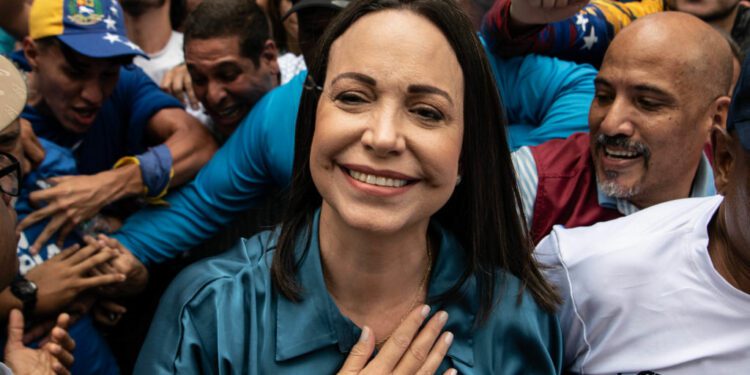Yet Chávez was feted by Western Leftists as a progressive idol supposedly fighting for social justice. Seduced by his social programmes, foolish Western celebrities, journalists and politicians turned a blind eye to his human rights abuses and looting. Never mind that his government fired 18,000 workers who went on strike in protest at the politicisation of the state-run oil firm, replacing them on the public payroll with loyalists. Former Labour leader Jeremy Corbyn called him an “inspiration” for demonstrating “wealth can be shared”, while his sidekick John McDonnell praised Venezuela for showing “the contrast between capitalism in crisis and socialism in action”. Hollywood actor Sean Penn called Chávez a model democrat, even demanding jail for “mainstream media” journalists who dared to brand him a dictator.
Amid all this naive adulation for the Chavismo creed, Venezuela’s economy ended up suffering the biggest collapse outside of wartime in the past half-century. A country with the world’s biggest oil reserves was hit by severe blackouts, hyperinflation and mass hunger as bakeries could not find flour, hospitals ran out of medicines and pro-government militia terrorised urban areas.
Faced with the inevitable disillusion that followed, last year Maduro tried to stir Venezuelans up into patriotic frenzy with a referendum on grabbing two-thirds of next-door Guyana after the discovery of big offshore oil reserves. But his ploy failed: turnout was thought to be lower than the 2.4 million voting in the opposition primaries, which were run without any state support. This did not stop the Venezuelan president from stunts such as printing new maps of his enlarged nation and granting energy licences for the disputed region, provoking fears the border dispute might be used to postpone the presidential election.
The tragedy of this failed revolution was symbolised by the mass exodus of people, many of whom fled across Latin America and into the United States. In the past two years alone, almost half a million Venezuelans entered the US. Two months ago, I was in Ecuador — home to the fourth largest number of these refugees and under a state of emergency amid spiralling gang violence — where I heard of growing hostility and xenophobia towards Venezuelan exiles. Yet one journalist told me how the region used to look wistfully at oil-rich Caracas, seeing a peaceful and prosperous beacon of stability.
But this is an election that might have immense significance extending far beyond those exiled Venezuelans who dream of going home. For if Maduro’s regime can be forced from power, it would be a serious setback for the axis of autocracy led by Russia and China that is engaged in an epochal global struggle against democracy, seen most acutely on the battlefields of Ukraine. As the journalist and historian Anne Applebaum dissects in her book Autocracy, Inc, Venezuela has evolved under Chávez and Maduro into a central player in an international alliance of repressive regimes. These states assist each other with a sinister and self-serving web of kleptocratic financial systems, surveillance technologies and propaganda machines to defy sanctions, shred internal dissent and challenge democratic freedoms. So Caracas developed commercial, fiscal and political links with Beijing and Moscow while Cuban security experts helped stifle opposition and showed them how to weaponise chronic food shortages created by theft and incompetence. Few were surprised when, in March, Maduro hailed the re-election of his Russian ally Vladimir Putin as “a flawless electoral process”.
Yet Applebaum points out that these Left-wing internationalists built their most important ties with the Islamic theocracy in Iran, highlighting how these new networks of repression are built on shared lust for power, wealth and impunity rather than ideology. “What binds them is oil, anti-Americanism, opposition to their own democracy movements and a shared need to learn the dark arts of sanctions evasion,” she writes. Iran has bought Venezuelan gold, advised on crushing dissent, helped with a drone factory and assisted with repairs on oil refineries. In return, Caracas has laundered cash for Hezbollah, the Iranian-backed terrorist group, and has provided passports for its leaders.
Source link : https://unherd.com/2024/07/the-iron-lady-who-could-save-venezuela/
Author :
Publish date : 2024-07-25 19:07:32
Copyright for syndicated content belongs to the linked Source.










